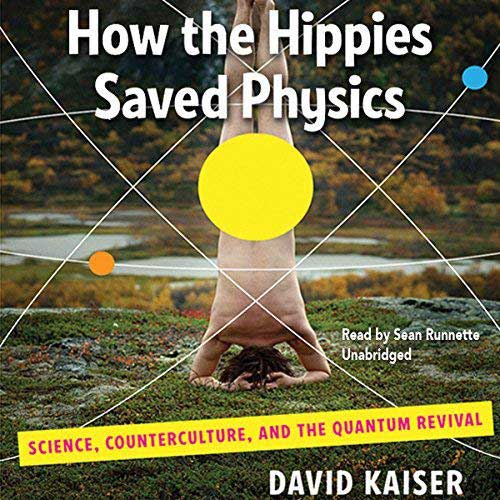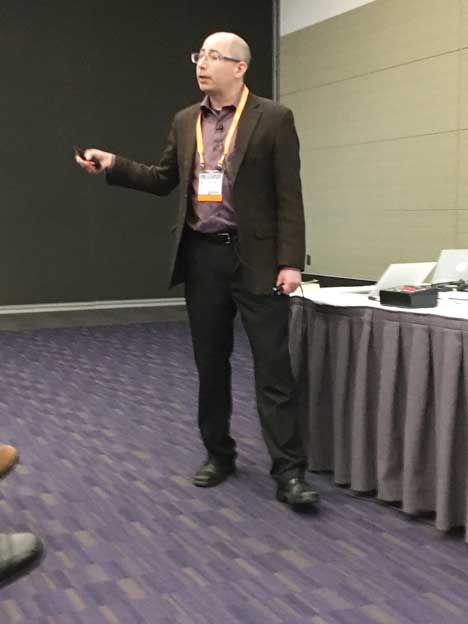March Session Reports: The Author in Dialogue: David Kaiser’s "How the Hippies Saved Physics"
By Paul Cadden-Zimansky
Despite an overnight Boston snowstorm, more than 80 attendees found their way to the Author in Dialogue: How the Hippies Saved Physics session that kicked off the FHP March Meeting offerings. The Dialogue session has become an annual tradition where the author of a recent popular book on the history of physics presents a summary of their work, followed by presentations from historians and physicists who have a different or complementary perspective on the topics it covers.
The first speaker, David Kaiser, author of the 2012 How the Hippies Saved Physics, began the session by explaining his motivation for looking into the 1970s-era mix of physics and counterculture. Using Ph.D.-production and AIP job-posting data from the end of the 1960s post-Sputnik, science-funding boom, Kaiser painted a grim picture of employment prospects for individuals who had the misfortune to time their Ph.D. completion to the start of the 1970s. Kaiser was interested in understanding the stories of these individuals, which led him to the Fundamental Fysiks Group – a regular Bay Area gathering of often under-employed physicists interested in the intersections of physics, philosophy, parapsychology, consciousness, and New Age thinking.
While many of the writings coming out of this group would be dismissed as markedly unscientific, Kaiser showed that they were the main champions of the significance of John Bell’s 1964 paper on non-local quantum entanglement throughout the 1970s. In Kaiser’s telling, through popular books, papers, and individual correspondences, members of the Group paved the way for quantum information theory to enter the mainstream of physics.
One of the establishment physicists who intersected with Fysiks Group members and spent part of the 1970s developing his own thoughts on quantum mechanics, information, and consciousness, was John Wheeler. The next session speaker, William Wootters, described a year-long graduate seminar he took with Wheeler during the ’78-’79 academic year on the “Theory of Measurement.” Wootters related how Wheeler presented students with potentially unsolvable problems and encouraged them to bring in their own physics conundrums as a way of generating thought and conversation about the practice of physics and the bases for vetting theories and experiments.
Wootters ended with a favorite story of Wheeler imagining all the governing equations of physics written out on pieces of paper, placed neatly down to tile a floor. In Wootters’ retelling the equations just sit there, but the universe they describe “flies” along. How, Wheeler queried, do we get the equations to fly?


David Kaiser, author of How the Hippies Saved Physics
The historian W. Patrick McCray took up the theme of flight in examining the work and proposals of another physicist whose scientific pursuits captured the imagination of the 1970s American public: Gerard O’Neill. O’Neill transitioned from 1960s particle accelerator physicist to human space colonization researcher and enthusiast who promoted his ideas in regular appearances on Johnny Carson’s The Tonight Show, articles in the newly created Omni magazine, and his 1977 book The High Frontier. McCray traced how O’Neill’s ideas still find purchase today from the pursuit of private sector human space flight by venture capitalists to contemporary science fiction visions of our near future in space.
The final speaker of the session, the physicist Alain Aspect, began his presentation by saying that he was an admirer of every part of Kaiser’s book except the title. While Aspect did not adhere to any theory of hippie influence in his own career trajectory, he did describe a “phase transition” that occurred between the '70s and '80s in the level of acceptance physicists had for research into quantum foundational questions.
Aspect recounted how his excitement over the 1964 entanglement paper led him to seek out John Bell’s guidance on experimentally testing non-local correlations. Before getting to any physics, Bell first asked Aspect whether he had a permanent position that would protect him against the opprobrium other physicists might cast towards one embarking on such tests. Aspect related how persistent work both in explaining Bell’s inequalities to other physicists and in closing a major loophole in John Clauser’s earlier tests of the inequalities coincided with both interest and acceptance of his research program by the time his results were published in 1982. Though research in quantum foundations gained acceptance, Aspect repeatedly relayed to the audience another piece of advice he got from Bell: “Don’t spend all your time thinking about quantum mechanics-otherwise you will go crazy.”
The articles in this issue represent the views of their authors and are not necessarily those of the Forum or APS.
